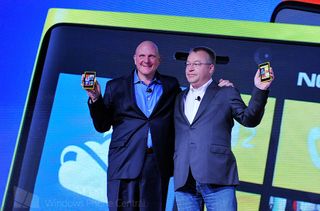Microsoft buying Nokia Devices and Services unit, licensing patents for €5.44 billion

It's been something mused over for the past few years as a "what if" scenario, and tonight it has come to fruition: Microsoft is buying Nokia's Device and Services Unit and licensing the company's patent portfolio. Since partnering with Microsoft in early 2011 and launching the Lumia line of Windows Phone handhelds Nokia has held a leading and premiere position in the Windows Phone space, though they have struggled to gain significant market share and profitability even with the financial support of Microsoft. The deal is expected to close in the first quarter of 2014, with Microsoft paying €3.79 billion for the Devices and Service Unit, and another €1.65 billion for the licensure of Nokia's patent portfolio.
The deal will see around 32,000 Nokia employees transferred to Microsoft. Additionally, Nokia CEO Stephen Elop is stepping aside as the company's chief executive, replaced by Risto Siilasmaa as interim CEO (formerly chairman of the Nokia Board of Directors). Elop isn't going away - he's assumed the role of Nokia Executive Vice President of Devices & Services - in other words, he's in charge of the division of Nokia that is being sold to Microsoft, and thus will be one of the 32,000 employees making the transition.
The deal is, of course, subject to approval by Nokia's shareholders. To wit, an "extraordinary general meeting" of said shareholders has been called for 19 November 2013. Microsoft and Nokia expect the deal to close in the first quarter of 2014. The total deal adds up to €5.44 billion, or $7.12 billion in US dollars.
Microsoft CEO Steve Ballmer, himself on the way out within the next 12 months, called the acquisition "a bold step into the future" and "an win-win for employees, shareholders, and consumers of both companies."
Bringing Nokia's devices edition into the fold follows Microsoft's first foray into consumer tablet hardware in late 2012 with the Surface line of tablets. Microsoft has been rumored to be working on a Surface smartphone running Windows Phone for some time, though it has never seemed likely for a release. Thanks to their tight partnership with Microsoft, Nokia has served as the defacto device manufacturer for Windows Phone; this acquisition only serves to strengthen that association.
Microsoft will have their work cut out for them in bringing Nokia's devices and services unit into the fold. Purchasing the most public parts of Nokia will no doubt change the Window Phone dynamic with regard to other licensees like Samsung and HTC. While some expressed displeasure with Microsoft's entry into the PC hardware business with the Surface tablets, the effort resulted in a $900 million writedown on just the Surface RT for Microsoft. Nokia is a different beast, holding a leading position in the Windows Phone space.
As part of the agreement Microsoft will also take custody of Nokia's Asha brand of phones. While the Lumia Windows Phone line sold 7.4 million devices in the second quarter of 2013, the S40-powered Asha devices saw sales of a whopping 53.7 million. The low cost devices are highly popular in the developing world.
Get the Windows Central Newsletter
All the latest news, reviews, and guides for Windows and Xbox diehards.
While Microsoft is purchasing the Devices and Services Unit of Nokia, the Finnish company will maintain control of their mapping unit and the HERE mapping and navigation platform. Microsoft has signed up as a "strategic licensee" of the service, though the four-year agreement is a separate deal from this acquisition. Additionally, Nokia will retain their network infrastructure businesses and Advanced Technologies development and licensing arm.
Source: Microsoft
Derek Kessler is Special Projects Manager for Mobile Nations. He's been writing about tech since 2009, has far more phones than is considered humane, still carries a torch for Palm, and got a Tesla because it was the biggest gadget he could find. You can follow him on Twitter at @derekakessler.

